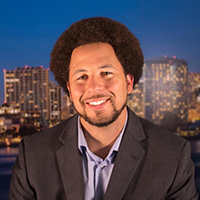Equity Minded Hiring Practices
 Dr. Frank Harris III, Dr. J. Luke Wood
Dr. Frank Harris III, Dr. J. Luke Wood
This course delves into the crucial realm of equity-minded faculty hiring practices within higher education institutions. Learners will gain insights into prevalent myths and misconceptions surrounding faculty of color, which often hinder efforts to cultivate diverse faculty communities in colleges and universities. By unpacking these misconceptions, learners will develop a nuanced understanding of the challenges and opportunities in fostering faculty diversity.
Moreover, the course equips learners with the skills to design hiring practices that prioritize faculty diversity. They will explore strategies that have demonstrated effectiveness in promoting fairness and equity throughout the faculty hiring process. From cultivating inclusive search committees to implementing proactive outreach strategies, learners will learn actionable steps to create a more inclusive and diverse faculty body.
After competing this course, learners will be empowered to advocate for and implement sustainable practices that support the recruitment and retention of diverse faculty members.

15 Hr

4 Credits

2 hours

Certificate with 1.5 CEUs
Equity Minded Hiring Practices
Course Description
COURSE DESCRIPTION
This course delves into the crucial realm of equity-minded faculty hiring practices within higher education institutions. Learners will gain insights into prevalent myths and misconceptions surrounding faculty of color, which often hinder efforts to cultivate diverse faculty communities in colleges and universities. By unpacking these misconceptions, learners will develop a nuanced understanding of the challenges and opportunities in fostering faculty diversity.
Moreover, the course equips learners with the skills to design hiring practices that prioritize faculty diversity. They will explore strategies that have demonstrated effectiveness in promoting fairness and equity throughout the faculty hiring process. From cultivating inclusive search committees to implementing proactive outreach strategies, learners will learn actionable steps to create a more inclusive and diverse faculty body.
After competing this course, learners will be empowered to advocate for and implement sustainable practices that support the recruitment and retention of diverse faculty members.
REQUIREMENTS
Access to a computer with an internet connection.
Fluent/advanced level of English required.
COURSE DURATION
You will have 30 days to complete each of the 2 modules of this training. Each module requires a 3-4 hour commitment (including lectures, discussion boards, readings).
GOAL OF THIS COURSE
- Recognize how implicit bias negatively impacts faculty hiring.
- Articulate the benefits of faculty diversity in college and universities.
- Align diverse faculty hiring process with other institutional goals and priorities.
- Apply common hiring strategies for diversifying faculty in colleges and universities including: implicit bias training, certification of applicant pools, equity-centered interviewing, inclusive search advocates, student engagement in the search process, inclusive job search criteria, cluster hiring, and teaching demonstrations.
Curriculum
1. Welcome and Instructions - Free
Welcome to the professional development program on Equity Minded Hiring Practices. You will have 30 days to complete this training, with learners engaging in activities over the course of five modules. Each module requires a 3-4 hour commitment (including lectures, discussion boards, readings).
Following the completion of each activity, you will need to mark the activity as “Complete”.
To complete the program, learners must complete the following activities:
1. Complete PRE-ASSESSMENT and POST ASSESSMENT.
2. Review all video modules – There are four modules in all. Our learning management system allows participants and faculty to review learner progress in completing video modules.
3. Read the assigned readings – There are assigned readings that are aligned with each of the modules. It is an expectation that readings will be completed before reviewing the module. The readings are comprehensive in nature, as such, we recommend planning ahead to ensure readings are completed on schedule. Comprehension of material will be gauged through the live interactive sessions.
4. Attend the live video sessions – Learners will have access to course faculty during a live interactive session. This is an opportunity to ask questions and engage in dialogue that is solution-oriented. It is expected that all learners will attend at least one live session. Live sessions will be recorded and posted for those who are unable to attend.
5. Complete short quizzes – Following each recorded presentation you will complete a brief quiz assessing your understanding of the material. Quizzes can be completed an unlimited number of times. It is recommend that you re-take quizzes until you correctly answer all questions.
6. Participate in asynchronous discussion forums. – As you complete each module, we encourage you to identify questions, comments, and reactions to the material as well as relevant resources and post them in the discussion forums. This is an opportunity for faculty and peers to engage in dialogue and knowledge sharing.
CORA Policies
DISCLOSURE The Center for Organizational Responsibility and Advancement (CORA) its employees, affiliates, and contractors shall disclose to learners, prior to the start of the learning event, any instructor’s proprietary interest in products, instruments, devices, services or materials discussed, as well as the source of any compensation related to the presentation. This should occur at the commencement of any learning event.
NON-DISCRIMINATION The Center for Organizational Responsibility and Advancement (CORA) its employees, affiliates, and contractors shall not discriminate against any individual or make explicit references of a discriminator nature based on gender, gender identity, race/ethnicity, religion, age, disability, socioeconomic status, and/or sexual orientation.
Module 1 - The Benefits of Diversifying Faculty
2. Module Objective - Free
After participating in this module:
- Learners will be able to explain the benefits of faculty diversity in college and universities.
- Learners will be able to assess how implicit bias negatively impacts faculty hiring.
3. Module 1 Video
The content of this lesson is locked. To unlock it, you need to Buy this Course.
4. L. White, R. Pedersen, C. Stanley, T. Hammond and K. Watson, "Uncomfortable Conversations Can Lead to Better Faculty Preparation and Engineering Pedagogy Centered on Humanity," 2023 IEEE Frontiers in Education Conference (FIE)
The content of this lesson is locked. To unlock it, you need to Buy this Course.
5. Greenwald, A. G., & Banaji, M. R. (1995). Implicit social cognition: Attitudes, self-esteem, and stereotypes. Psychological Review, 102(1), 4–27.
The content of this lesson is locked. To unlock it, you need to Buy this Course.
6. Assessment-Module 1
The content of this lesson is locked. To unlock it, you need to Buy this Course.
Module 2 - Strategies and Practices for Diversifying the Faculty
7. Module Objective
After participating in this module:
- Learners will be able to plan and manage the alignment of a diverse faculty hiring process with other institutional goals and priorities.
- Learners will be able to apply several specific hiring strategies for diversifying faculty in colleges and universities.
- Learners will be able to employ strategies to support the retention of diverse faculty after their transition to the college or university.
8. Module 2 Video
The content of this lesson is locked. To unlock it, you need to Buy this Course.
9. Equity-Minded Faculty Hiring Practices: Promoting Fairness, Inclusion, and Faculty Diversity to Support Student Success in Higher Education
The content of this lesson is locked. To unlock it, you need to Buy this Course.
10. Module 2 Assessments
The content of this lesson is locked. To unlock it, you need to Buy this Course.
Live Video Session
11. Module Objective
These sessions will provide an opportunity for learners to interact with Faculty, ask questions about course content, and share ideas and activities from your campus.
- Please be prepared with 2 questions for the Faculty
- Please test your system early to be sure you are prepared for the session
Live Video Session dates are listed in the course Live Session module and occur on selected Wednesday and Friday Mornings starting at 09:30 am PST. You must complete at least 1 live video sessions to receive your certificate. You can request for the recording of the live video sessions and it will be made available to you once the session is complete.
12. Live Video Session Participation
The content of this lesson is locked. To unlock it, you need to Buy this Course.
13. Live Video Session Recording
The content of this lesson is locked. To unlock it, you need to Buy this Course.
Certificate of Completion
14. Module Objective
To obtain your certificate of completion. Please make sure you have viewed, completed, and marked all activities as complete.
15. Certification of Completion
The content of this lesson is locked. To unlock it, you need to Buy the Course.
About Instructor

Frank Harris III
Dr. Frank Harris III is a professor of postsecondary education and Co-Director of the Community College Equity Assessment Lab (CCEAL) at San Diego State University. He is best known for his expertise in racial [in]equity in postsecondary education and has made important contributions to knowledge about college student development and the social construction of gender and race in college contexts. His work prioritizes populations that have been historically underrepresented and underserved in education.

J. Luke Wood
J. Luke Wood, Ph.D. is Dean’s Distinguished Professor of Education and Vice President for Student Affairs & Campus Diversity at San Diego State University. Formerly Wood served as Associate Vice President for Diversity and Innovation. Dr. Wood is also Co-Director of the Community College Equity Assessment Lab (CCEAL), a national research and practice center that partners with community colleges to support their capacity in advancing outcomes for men of color. He has delivered over 1,000 scholarly and conference presentations and more than 150 publications to his credit, including 15 books and 75 peer-reviewed journal articles.

